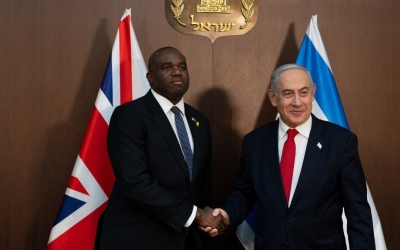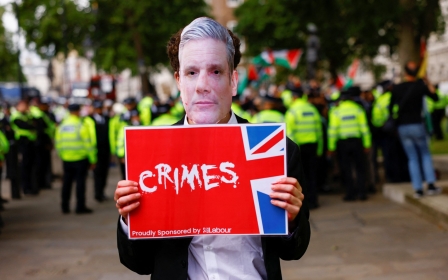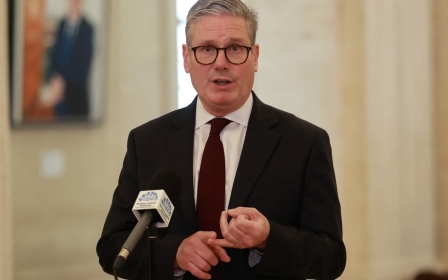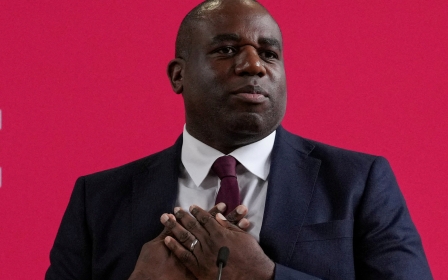Labour promised 'change'. But with Israel, it's business as usual
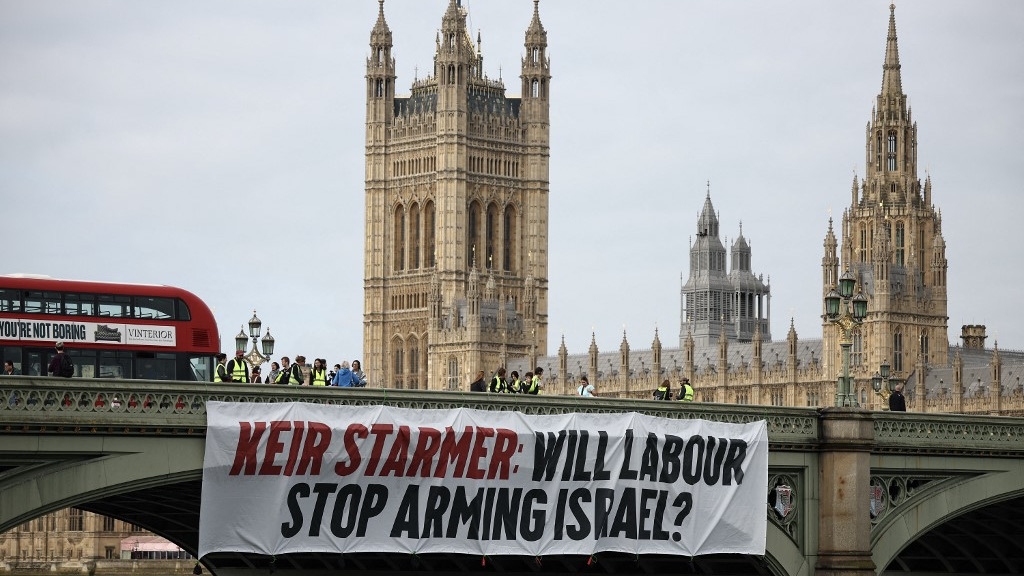
The UK's governing Labour Party will be holding its annual conference in Liverpool from 22-25 September.
While the mood is likely to be festive, assessing Labour's response to the genocide in Palestine over the two and a half months that they have been in power shows there is little cause for celebration.
Keir Starmer’s election message in the lead-up to the 4 July elections was simple: “Change.”
However, when it comes to Israel, its genocidal war in Palestine and its insatiable appetite to ignite a regional war, Labour’s policy is a continuation of the Conservatives'.
Despite election promises that their foreign policy would be governed by a respect for international law, Israel continues to receive unwavering support, something Starmer proclaimed as a “Labour tradition” back in 2021.
New MEE newsletter: Jerusalem Dispatch
Sign up to get the latest insights and analysis on Israel-Palestine, alongside Turkey Unpacked and other MEE newsletters
And despite the outrage of pro-Israeli politicians and commentators (who seem to think Israel’s actions should have no negative consequences), the decisions to restore funding to the United Nations agency for Palestine refugees (Unrwa), or drop an objection to the International Criminal Court’s arrest warrants against Israeli leaders, do not put any meaningful pressure on Israel to end its genocide, let alone remove the obstacles to Palestinian self-determination.
The latest example of this was the UK government's abstention on a UN resolution demanding that Israel end its "unlawful presence" in the occupied West Bank and the Gaza Strip within a year, which was overwhelmingly passed on Wednesday. It put the UK among the 57 states that failed to back the motion, against 124 voting for it.
UK military complicity
Much was made of the self-proclaimed “friend of Israel” and “liberal, progressive Zionist” Foreign Secretary David Lammy’s decision at the beginning of September to suspend a measly 30 of 350 arms export licenses to Israel.
Reflecting the typical paranoia of a militarised settler colony, pro-Israeli politicians and commentators parroted Israeli politicians in crying foul and saying that this would embolden Hamas “terrorists” and, of course, terrorist-state-in-chief, Iran.
This could not be further from the truth.
In his speech, Lammy made it very clear that these actions would not “have a material impact on Israel’s security” (read: its ability to wage war).
Among the exports that would continue are parts for the F-35 fighter jet, 15 percent of the value of which is produced here in the UK.
A recent investigation found that this fighter jet was used to carry out the 13 July massacre in the Al-Mawasi area, which killed 90 people and injured over 300 others.
Given this, it is hard to interpret the decision to suspend licences as motivated by a respect for international humanitarian law. Rather, it is a weak attempt to appease growing public calls for an arms embargo on Israel.
The UK’s military complicity in the ongoing genocide, however, goes deeper than the supply of weapons to Israel’s occupation forces.
Rather, since October last year, reports continue to emerge of the British military’s active involvement in the war, primarily through intelligence gathering and the funnelling of (mostly US) weapons to Israel through the RAF Akrotiri base in Cyprus.
It is also from here that UK jets conduct their air strikes on Yemen to break the naval blockade that Sanaa has imposed on all shipping headed to Israel.
While the activities at RAF Akrotiri were shrouded in secrecy by the Tory government, Labour has not shed light on this issue, nor have they indicated a change in policy.
Indeed, it continues to be used to punish Yemen’s solidarity with the people of Palestine - the US-UK air strike on a girls’ school in southwest Yemen being the latest example of how Labour will treat those who challenge Israel.
Rewarding a rogue state
What perhaps is most unsettling is how Israel’s allies continue to treat it as a “partner”, or a “democracy” - statements that seem completely removed from the reality we see unfolding on the news and social media.
This is exemplified in Lammy’s decision to visit Israel soon after taking office and shake hands with war criminals such as Prime Minister Benjamin Netanyahu and President Isaac Herzog.
This attitude of business as usual again appears through Labour’s attempts to secure a free trade deal with Israel - a process that began under the Conservatives.
Although the government claims that this will bring prosperity to British workers in a post-Brexit world, the Trade Union Congress (TUC), representing 5.5 million workers, condemned the trade talks back in March, citing “Israel’s persistent violations of international law, UN resolutions and systematic violations of Palestinian labour and human rights”.
Palestinians have long known that the entirety of the Israeli economy is premised on their dispossession and, in July, the International Court of Justice (ICJ) ruled that all states are obligated to not support the illegal occupation. Instead, Labour has chosen to reward Israel, literally conducting business as usual during occupation and genocide.
The Palestine solidarity movement refuses to go back to "life as normal" amid a genocide in Gaza, which has now spread to the West Bank.
Starmer has followed in the steps of the Conservatives by providing Israel with the diplomatic and military support it needs, while offering empty gestures to Palestinians
Since Labour came into power, over 3,000 Palestinians have been killed in Gaza, with the death toll now having surpassed 41,000.
Starmer has followed in the steps of the Conservatives by providing Israel with the diplomatic and military support it needs, while offering empty gestures and promises to the Palestinian people.
In the immediate aftermath of the election, there seemed to be a moment of realisation for Labour that they had lost the votes of many with pro-Palestinian sentiments, particularly among the youth and Muslims.
The party promised to take notice but, as we take stock of what they have achieved in their first two and a half months in office, can we truly say that the government has done all it can to end the genocide?
The answer is no - arms sales continue; military and intelligence coordination continues; trade talks continue; and, more fundamentally, an increasingly fascist and rogue Israel continues to be treated as a partner.
Over the past 11 months, the Palestine solidarity movement has mobilised in unprecedented numbers, whether through protests, student encampments, trade union and direct actions, or lobbying.
It must now mobilise again at the Labour Party conference in Liverpool and disrupt the delegates’ celebratory mood.
We must send a clear message that we will not allow a return to normalcy during a genocide, nor will we overlook Labour’s complicity in the crimes being committed against the Palestinian people.
The views expressed in this article belong to the author and do not necessarily reflect the editorial policy of Middle East Eye.
Middle East Eye delivers independent and unrivalled coverage and analysis of the Middle East, North Africa and beyond. To learn more about republishing this content and the associated fees, please fill out this form. More about MEE can be found here.



